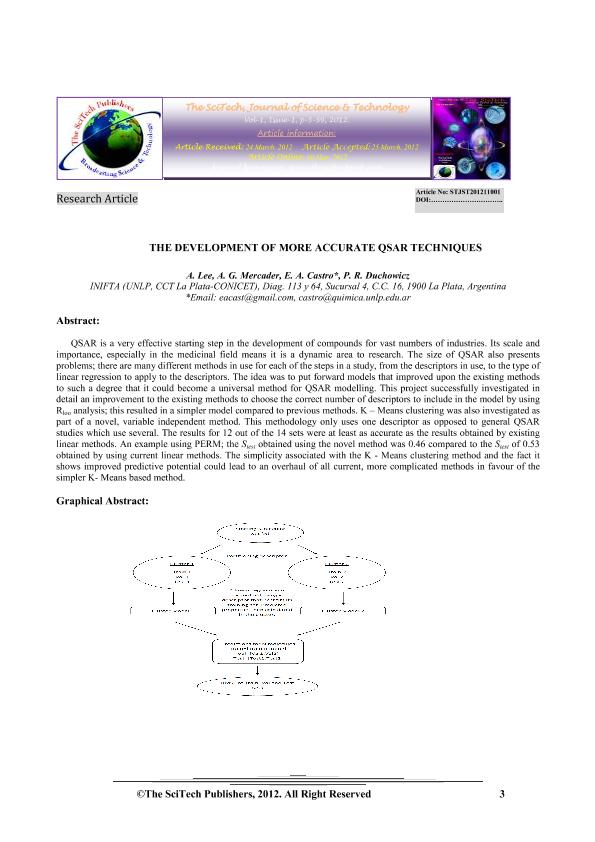Mostrar el registro sencillo del ítem
dc.contributor.author
Lee, Adam
dc.contributor.author
Mercader, Andrew Gustavo

dc.contributor.author
Castro, Eduardo Alberto

dc.contributor.author
Duchowicz, Pablo Román

dc.date.available
2020-04-21T20:27:15Z
dc.date.issued
2012-05
dc.identifier.citation
Lee, Adam; Mercader, Andrew Gustavo; Castro, Eduardo Alberto; Duchowicz, Pablo Román; The Development of More Accurate QSAR Techniques; The SciTech Publishers; The SciTech, Journal of Science & Technology; 1; 1; 5-2012; 3-39
dc.identifier.issn
2278-5329
dc.identifier.uri
http://hdl.handle.net/11336/103247
dc.description.abstract
QSAR is a very effective starting step in the development of compounds for vast numbers of industries. Its scale and importance, especially in the medicinal field means it is a dynamic area to research. The size of QSAR also presents problems; there are many different methods in use for each of the steps in a study, from the descriptors in use, to the type of linear regression to apply to the descriptors. The idea was to put forward models that improved upon the existing methods to such a degree that it could become a universal method for QSAR modelling. This project successfully investigated in detail an improvement to the existing methods to choose the correct number of descriptors to include in the model by using Rloo analysis; this resulted in a simpler model compared to previous methods. K – Means clustering was also investigated as part of a novel, variable independent method. This methodology only uses one descriptor as opposed to general QSAR studies which use several. The results for 12 out of the 14 sets were at least as accurate as the results obtained by existing linear methods. An example using PERM; the Stest obtained using the novel method was 0.46 compared to the Stest of 0.53 obtained by using current linear methods. The simplicity associated with the K - Means clustering method and the fact it shows improved predictive potential could lead to an overhaul of all current, more complicated methods in favour of the simpler K- Means based method.
dc.format
application/pdf
dc.language.iso
eng
dc.publisher
The SciTech Publishers
dc.rights
info:eu-repo/semantics/openAccess
dc.rights.uri
https://creativecommons.org/licenses/by-nc-sa/2.5/ar/
dc.subject
Qsar Theory
dc.subject
Replacement Method
dc.subject
K-Means Clustering
dc.subject
Molecular Descriptors
dc.subject.classification
Otras Ciencias Químicas

dc.subject.classification
Ciencias Químicas

dc.subject.classification
CIENCIAS NATURALES Y EXACTAS

dc.title
The Development of More Accurate QSAR Techniques
dc.type
info:eu-repo/semantics/article
dc.type
info:ar-repo/semantics/artículo
dc.type
info:eu-repo/semantics/publishedVersion
dc.date.updated
2019-01-02T19:42:46Z
dc.identifier.eissn
2348-098X
dc.journal.volume
1
dc.journal.number
1
dc.journal.pagination
3-39
dc.journal.pais
India

dc.description.fil
Fil: A. Lee.
dc.description.fil
Fil: Mercader, Andrew Gustavo.
dc.description.fil
Fil: E. A. Castro.
dc.description.fil
Fil: Duchowicz, Pablo Román.
dc.journal.title
The SciTech, Journal of Science & Technology
dc.relation.alternativeid
info:eu-repo/semantics/altIdentifier/url/https://sites.google.com/a/thescitechpub.com/thescitech/issues
Archivos asociados
